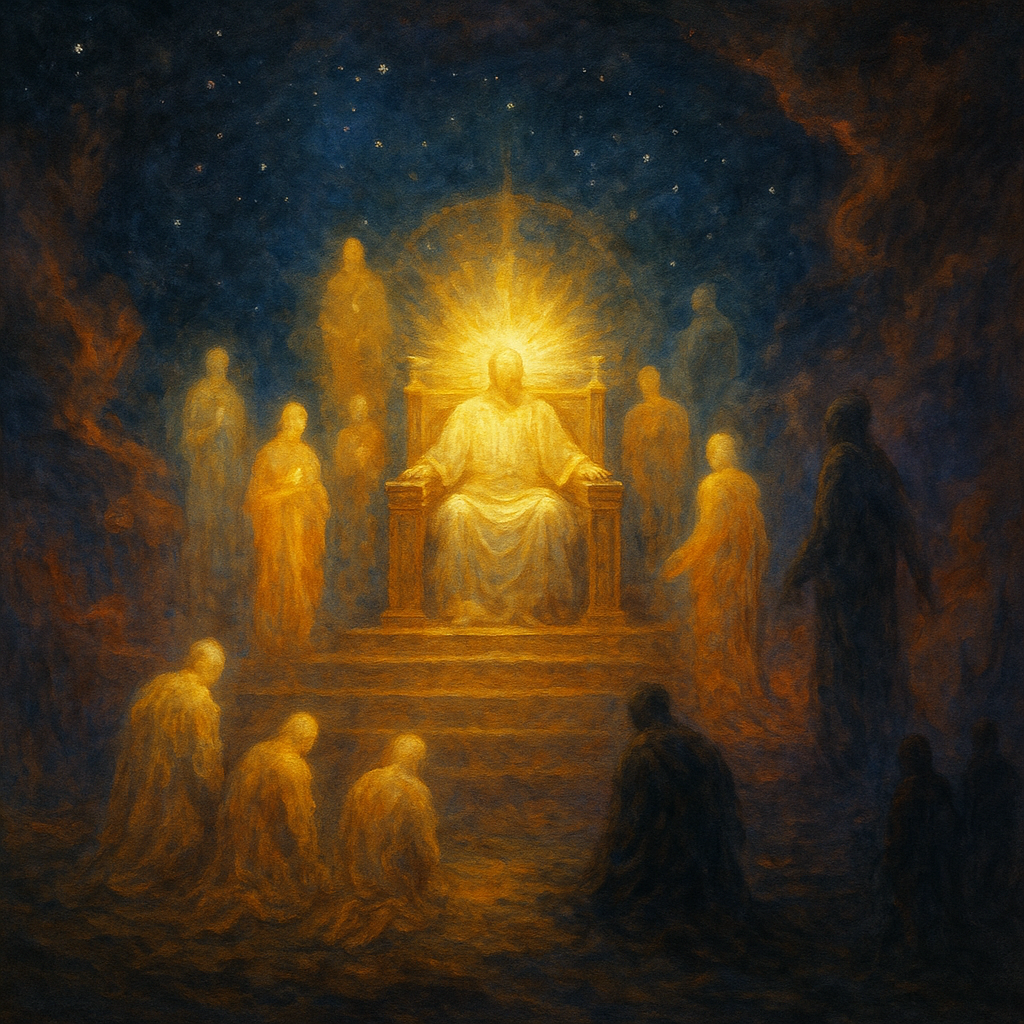
What we today call biblical monotheism did not deny the existence of other spiritual beings. Instead, it affirmed that only one God, Yahweh, is uncreated, eternal, and supreme over all. The biblical writers used the Hebrew word elohim to refer to beings who inhabit the spiritual realm. In English Bibles, elohim is most often translated as “God” when referring to Yahweh. However, the same word is also used in the Hebrew text for other beings, such as angels, foreign gods, and even the spirits of the dead.
What makes Yahweh unique is not the term itself, but His nature. He alone is the Creator, and He alone possesses ultimate authority. The other elohim are real, but they are created beings whose existence does not diminish His supremacy. Worship belongs to Yahweh alone, not because no other spiritual beings exist, but because only He is worthy of it.
Scripture presents a consistent picture of a populated spiritual realm. Psalm 82 depicts God standing in the divine council, judging other elohim. Deuteronomy 32:8–9 reveals that the nations were divided among the sons of God, while Israel was kept as Yahweh’s own inheritance. In Job 1, heavenly beings present themselves before God. These texts are not metaphorical. They reflect a worldview in which Yahweh reigns supreme among many spiritual beings, none of whom share His nature or authority.
This understanding of monotheism is relational and covenantal. It is not about counting spiritual beings, but about recognizing who is worthy of worship. Biblical monotheism is the exclusive devotion to the Most High Creator, not a claim that all other spiritual beings are imaginary or irrelevant.
How the Definition Changed in the 19th and 20th Centuries
During the 19th century, scholars in Europe began applying evolutionary models to religion. They proposed that belief systems advanced in stages: from animism, to polytheism, to henotheism, and eventually to monotheism. According to this framework, biblical faith was not divinely revealed but merely the latest and most refined stage of human religious development. Thinkers like Max Müller and Julius Wellhausen categorized biblical texts in ways that supported this theory, suggesting that Israel’s monotheism did not emerge until the prophetic or exilic period. This idea undermined the consistency and unity of the biblical witness by treating it as a collection of competing theological layers.
In the 20th century, the redefinition continued. Monotheism came to be seen not as exclusive worship of one God, but as the belief that only one divine being qualifies for the category of “god.” Other spiritual beings were still acknowledged, such as angels, demons, and Satan, but they were reclassified into separate categories and stripped of any language that could associate them with divine authority or rulership. Terms like gods, elohim, or sons of God were either translated away or explained in ways that avoided conflict with the modern framework.
As a result, the rich biblical portrayal of a divine council, spiritual rebellion, and cosmic hierarchy was flattened into a safer, more abstract system. The supernatural world remained populated, but only with beings understood as radically different in nature from God. They were no longer referred to as elohim in any meaningful sense. The Bible’s spiritual structure was preserved in part, but its vocabulary and implications were domesticated.
This shift had enormous consequences. It obscured the spiritual conflict that runs throughout Scripture and made it harder for modern readers to grasp the true stakes of idolatry, false worship, and divine judgment. It also reinforced the mistaken idea that the Bible evolved from polytheistic origins, when in fact its authors consistently proclaimed the supremacy of Yahweh while acknowledging the reality of other divine beings.
Why This Is Not Polytheism
Polytheism is not simply the belief in many spiritual beings. It is a system in which multiple gods receive worship and exercise competing or overlapping authority. In polytheistic systems, gods can rise or fall in prominence. They may be born, die, or change form. Power is distributed across a pantheon, with no single deity holding permanent and unrivaled rule. Worshipers often align themselves with whichever god best serves their needs or offers the most favorable outcome.
This stands in stark contrast to the biblical view. Yahweh does not rise or fall. He was not born, and He cannot be overthrown. His dominion is eternal, and He alone is the Creator of all things. The existence of lesser spiritual beings does not diminish His sovereignty. On the contrary, it highlights His role as the one who delegates authority, holds court over the divine council, and ultimately judges all rebellion. In passages like Psalm 82, the other elohim are real, but they are held accountable by the Most High. Their downfall is certain, and their authority is temporary.
The key difference is that biblical monotheism calls for exclusive worship of Yahweh, not because others do not exist, but because only He is worthy. Polytheism distributes power and loyalty across many gods. The Bible calls for undivided allegiance to the one who created everything.
Why Recovering the Biblical View Matters
Restoring the biblical definition of monotheism helps us recover the Bible’s original supernatural worldview. It makes sense of otherwise puzzling passages and clarifies the nature of spiritual warfare. It also refutes the claim that Israel’s faith evolved from earlier polytheistic traditions. From the earliest texts, the Bible presents Yahweh as supreme, surrounded by other spiritual beings, but ruling over them with absolute authority.
Understanding this framework allows Christians to better grasp the cosmic conflict behind idolatry, the mission of Jesus to reclaim the nations, and the destiny of believers to share in His rule. It also exposes the false systems of worship that mimic divine hierarchy but are rooted in rebellion. True monotheism is not a denial of spiritual reality. It is a declaration of loyalty to the one true God.
Conclusion
Modern theology often acknowledges the existence of angels, demons, and other spiritual beings, but it tends to avoid describing them in the biblical language of gods or elohim. This narrowing of categories flattens the supernatural world of Scripture and redefines monotheism in a way that disconnects it from the biblical authors’ intent. The Bible never asks readers to believe Yahweh is the only spiritual being in existence. It calls them to worship Him alone because He is the uncreated Creator and sovereign King. The other elohim, while real, are created, limited, and ultimately subject to judgment. Recovering this vision restores clarity to the biblical narrative and reminds us that monotheism is not about spiritual math—it is about loyalty to the Most High.
DISCUSSION QUESTIONS
- How does the biblical use of the term elohim challenge modern theological categories of angels, demons, and gods?
- Why is it important to distinguish between the existence of other spiritual beings and the exclusive worship of Yahweh?
- In what ways did 19th- and 20th-century scholarship alter the way people read the Bible’s portrayal of the spiritual realm?
- How does recognizing a divine council and spiritual hierarchy enhance our understanding of passages like Psalm 82 or Deuteronomy 32:8–9?
- What are the dangers of reducing monotheism to a purely philosophical idea rather than seeing it as a call to covenantal loyalty?
WANT TO KNOW MORE?
- Michael S. Heiser, The Unseen Realm: Recovering the Supernatural Worldview of the Bible
Heiser brings clarity to the Bible’s use of elohim, the divine council, and the spiritual realm, helping readers recover the original context for biblical monotheism without compromise. - Stephen G. Dempster, Dominion and Dynasty: A Theology of the Hebrew Bible
A biblical theology that shows the consistent thread of Yahweh’s supreme authority throughout the Old Testament, tying together divine kingship, covenant, and cosmic order. - John H. Walton, Ancient Near Eastern Thought and the Old Testament: Introducing the Conceptual World of the Hebrew Bible
Explores how the Bible speaks into its cultural context without borrowing theology from it, helping readers distinguish between shared terminology and uniquely biblical claims. - Carmen Joy Imes, Bearing God’s Name: Why Sinai Still Matters
A readable and deeply grounded exploration of what it meant for Israel to be loyal to Yahweh alone, and how that loyalty defined biblical monotheism in the face of surrounding gods. - Brian S. Rosner, Paul and the Law: Keeping the Commandments of God
While focused on Paul, Rosner highlights how loyalty to Yahweh remained central to Jewish and early Christian identity in a world full of competing spiritual powers.




